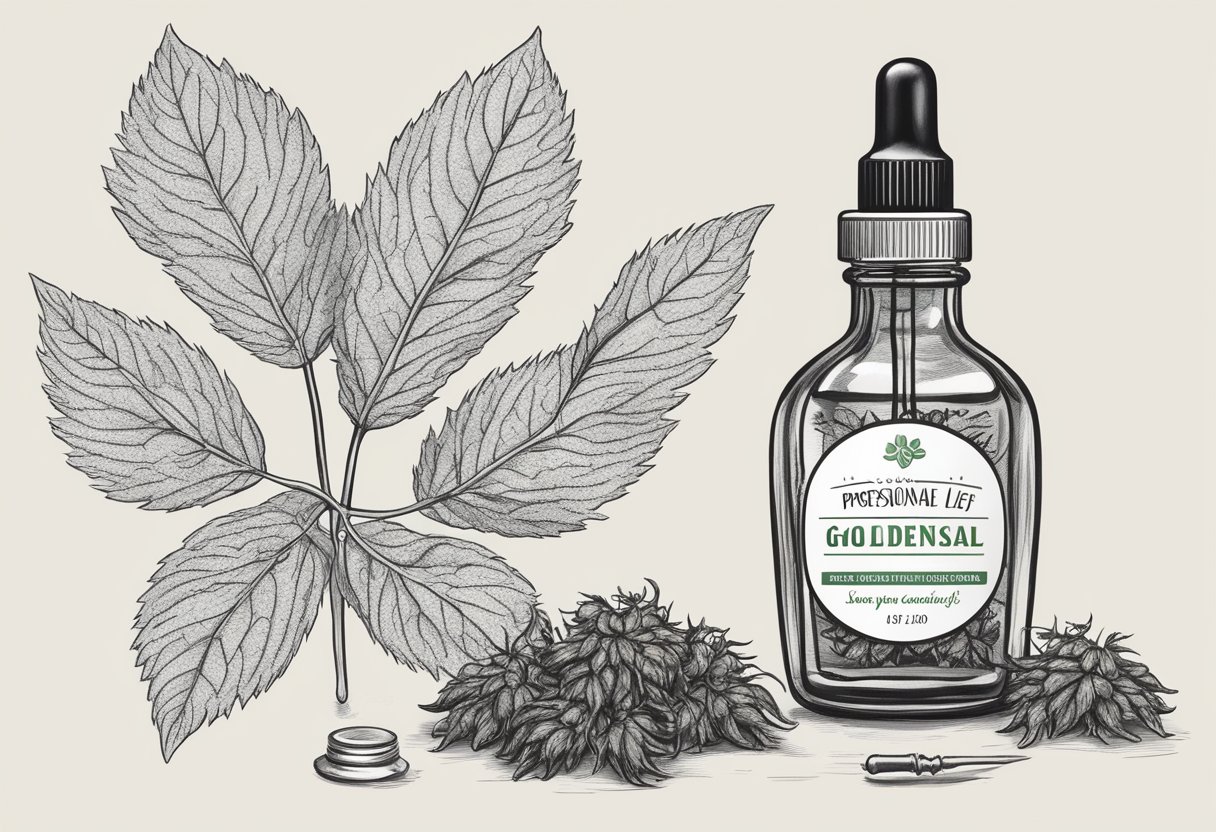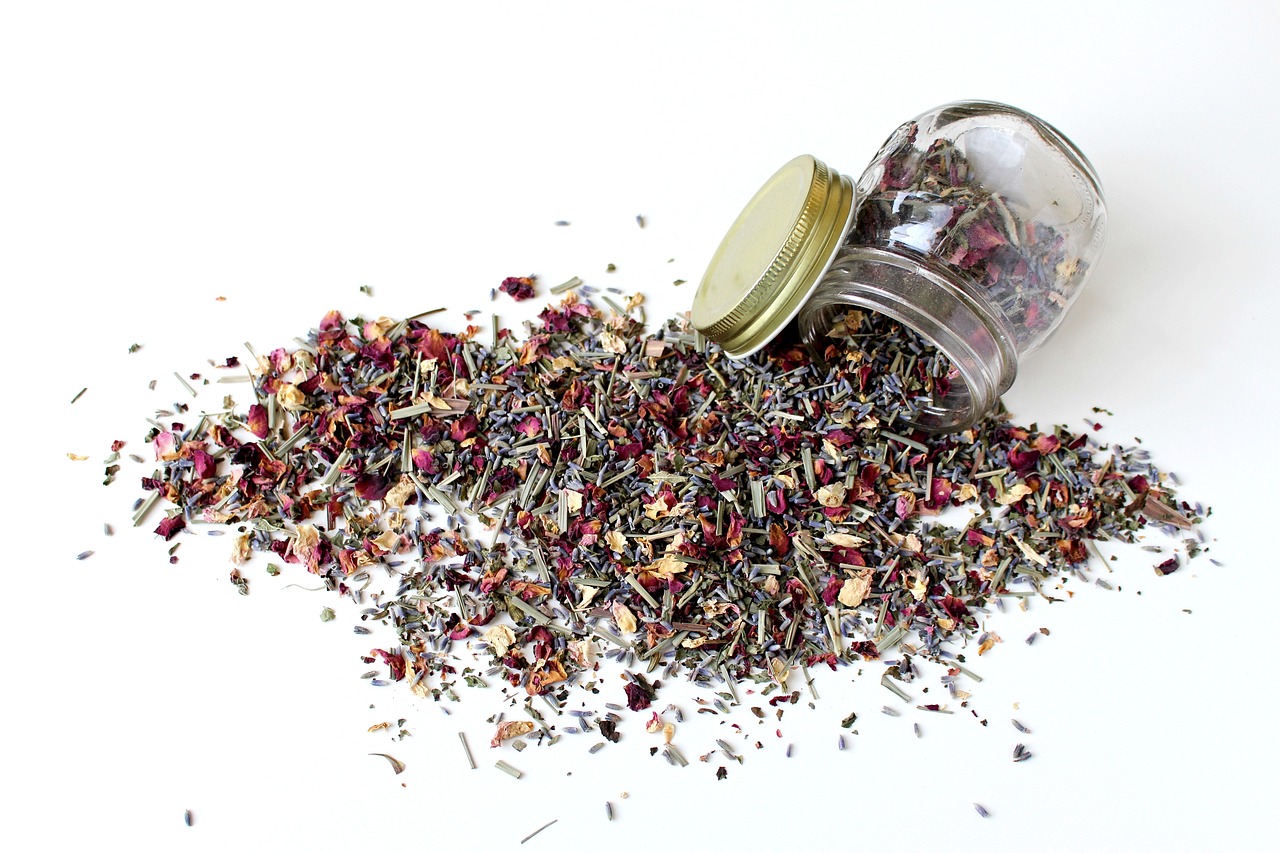What are herbal bitters? Bitters are a type of tonic made from a combination of bitter herbs, roots, and fruits steeped in alcohol. They have been used for centuries to support digestive health and improve overall well-being. Although they are often associated with alcoholic beverages, herbal bitters can also be taken as a supplement or added to food and drink recipes.
Disclaimer: This article is provided for informational purposes only and should not replace professional medical advice. Please consult with a qualified healthcare practitioner or herbalist before using any herbal remedies.
Herbal bitters are made by steeping a combination of bitter herbs, roots, and fruits in alcohol. The resulting tonic is taken to stimulate digestion, improve appetite, and promote overall well-being. Some of the common ingredients in herbal bitters include gentian root, dandelion root, burdock root, artichoke leaf, and citrus peel. These ingredients are believed to have a range of health benefits, including anti-inflammatory, antioxidant, and antimicrobial properties.
The Role of Herbal Bitters in Digestive Health
Herbal bitters are believed to stimulate the production of digestive juices, including bile, enzymes, and stomach acid. This can help to improve digestion, reduce bloating and gas, and relieve constipation. Additionally, bitters are thought to support liver function, which can help to detoxify the body and improve overall health. While herbal bitters are generally considered safe, they can cause side effects in some people, particularly those with digestive disorders or liver disease. It is important to talk to your healthcare provider before taking herbal bitters to ensure they are safe for you.
Key Takeaways
- Herbal bitters are a type of tonic made from bitter herbs, roots, and fruits steeped in alcohol.
- They are believed to stimulate digestion, improve appetite, and promote overall well-being.
- While generally considered safe, herbal bitters can cause side effects in some people and should be used with caution.
Understanding Herbal Bitters
Herbal bitters are a concentrated blend of bitter herbs, plants, and ingredients that are used to promote digestive health and well-being. Bitter flavors and foods have been used for centuries to aid digestion and improve overall health.
Bitter compounds in herbal bitters stimulate the bitter taste receptors on our taste buds, triggering the release of digestive enzymes and promoting the flow of bile from the liver and gallbladder. This helps to break down food and improve nutrient absorption, while also supporting healthy liver function.
Some of the common bitter herbs and plants used in herbal bitters include dandelion, gentian, burdock, wormwood, and chamomile. These herbs are known for their digestive and liver-supportive properties, and are often used in traditional medicine to treat a range of ailments.
Orange bitters, a popular type of bitters, are made with bitter orange peel and a blend of other herbs and spices. They are often used in cocktails and other beverages to add a bitter, citrusy flavor.
While herbal bitters have been used for centuries as a natural remedy for digestive issues, it is important to note that they are not a substitute for medical treatment. If you are experiencing serious digestive problems or other health issues, it is important to consult with a healthcare professional.
The Role of Herbal Bitters in Digestive Health
Herbal bitters are a combination of bitter-tasting herbs that are used to support healthy digestion. They have been used for centuries in traditional medicine to stimulate digestive juices and enzymes, which help to break down food and aid in nutrient absorption.
The digestive process is complex and involves several organs, including the stomach, liver, pancreas, and small intestine. When any of these organs are not functioning properly, it can lead to digestive issues such as bloating, gas, and constipation. Herbal bitters can help to support these organs and promote healthy digestive function.
One of the main benefits of bitters is that they can help to stimulate the production of digestive juices and enzymes. These substances are essential for breaking down food and extracting nutrients from it. When we eat a meal, our digestive system responds by releasing digestive juices and enzymes. Herbal bitters can help to enhance this digestive response, which can lead to improved nutrient absorption and overall digestive health.
In addition to supporting healthy digestion, herbal bitters can also help to alleviate digestive issues. For example, if you suffer from bloating or gas after meals, bitters can help to relieve these symptoms by promoting the release of digestive juices and enzymes. They can also help to stimulate the digestive tract, which can help to alleviate constipation and promote regular bowel movements.
Overall, bitters can be a valuable tool for anyone looking to support healthy digestive function. By promoting the production of digestive juices and enzymes and supporting the entire digestive system, herbal bitters can help to alleviate digestive issues and promote optimal digestive health.
Common Ingredients in Herbal Bitters
When it comes to herbal bitters formulas, there are a few common ingredients that are often used. These ingredients are known for their medicinal properties and are believed to help with digestive issues and other ailments. In this section, we will explore some of the most common ingredients found in herbal digestive bitters.
Roots
Roots are a common ingredient in herbal medicine, and they are often used in herbal remedies for digestive issues. Some of the most common roots used in herbal bitters include burdock root, dandelion root, gentian root, and angelica root. Burdock root is known for its detoxifying properties, while dandelion root is believed to have diuretic properties. Gentian root is known for its bitter taste and is often used to stimulate digestion, while angelica root is believed to have anti-inflammatory properties.
Herbs
Herbs are another common ingredient in herbal products, and they are often used for their medicinal properties. Some of the most common herbs used in bitters include licorice root, artichoke leaf, fennel seed, ginger root, lemon balm, and orange peel. Licorice root is believed to help soothe the digestive tract, while artichoke leaf is known for its liver-protective properties. Fennel seed is often used to help with bloating and gas, while ginger root is believed to have anti-inflammatory properties. Lemon balm is often used to help with anxiety and stress, while orange peel is believed to have anti-inflammatory and antioxidant properties.
Other Ingredients
In addition to roots and herbs, other ingredients are often used in herbal bitters. Two of the most common ingredients are high-proof alcohol and organic apple cider vinegar. High-proof alcohol is used to extract the medicinal properties from the herbs and roots, while organic apple cider vinegar is believed to help with digestion and detoxification.
Overall, herbal bitters are a popular herbal remedy for digestive issues. By using a combination of roots, herbs, and other ingredients, bitters can help stimulate digestion, soothe the digestive tract, and promote overall digestive health.
How Herbal Bitters Work
Herbal bitters are a type of liquid extract made from bitter-tasting plants. They are often used to support digestion and improve overall health. But how exactly do herbal bitters work?
First, let’s talk about bitter receptors. These are specialized taste receptors located on the tongue and throughout the digestive tract. When we taste something bitter, these receptors are activated and send signals to the brain and digestive system.
When we consume bitters, the bitter compounds in the plants stimulate these receptors, triggering a cascade of events that support digestion. For example, bitter compounds can stimulate the salivary glands, which release enzymes that help break down food in the mouth.
In the gastrointestinal tract, bitter compounds can stimulate the vagus nerve, which plays a key role in digestion. This can increase the production of gastric juices, including hydrochloric acid, which is important for breaking down food in the stomach.
However, it’s important to note that herbal bitters should only be used if there is enough stomach acid present. If someone is experiencing acid reflux, for example, adding more acid through bitters can make the problem worse.
Overall, bitter taste is one of the five basic tastes, along with sweet, sour, salty, and umami. While bitter taste is often associated with negative experiences, in its pure form, it can actually have many health benefits. Herbal bitters are one way to harness the power of bitter compounds for improved digestion and overall health.
Health Benefits of Herbal Bitters
Herbal bitters have been used for centuries as a natural remedy to help improve overall health. Here are some of the potential health benefits of consuming bitters:
Healthy Skin
Herbal bitters may help promote healthy skin due to their high antioxidant content. Antioxidants help protect the skin from harmful free radicals that can cause damage and premature aging. Additionally, some bitters contain ingredients that have anti-inflammatory properties, which can help soothe irritated skin.
Healthy Blood Sugar Levels
Some studies suggest that certain herbs found in herbal bitters may help regulate blood sugar levels. For example, bitter melon, a common ingredient in many herbal bitters, has been shown to help improve insulin sensitivity and lower blood sugar levels in people with diabetes.
Immune System
Herbal bitters may help boost the immune system due to their high concentration of vitamins and minerals. Many herbs found in bitters, such as echinacea and elderberry, have been shown to have immune-boosting properties that can help fight off infections and illnesses.
Gut Health
Herbal bitters can also help improve gut health by promoting healthy digestion. Bitter herbs stimulate the production of digestive enzymes, which can help break down food more efficiently. Additionally, some herbs found in bitters, such as ginger and peppermint, have been shown to help soothe digestive issues like bloating and gas.
Liver Function
Herbal bitters are often used to support liver function and promote detoxification. Many herbs found in bitters, such as dandelion and milk thistle, have been shown to have hepatoprotective properties, meaning they can help protect the liver from damage and improve liver function.
Overall, herbal bitters can be a natural and effective way to support overall health and well-being. However, it’s important to speak with a healthcare provider before adding herbal bitters to your diet, especially if you have any underlying health conditions or are taking medications.
Potential Side Effects and Precautions
When it comes to herbal bitters, it is important to be aware of potential side effects and take necessary precautions. While herbal bitters are generally considered safe, there are a few things to keep in mind.
First and foremost, it is important to follow the recommended dosage and method of administration. This information can typically be found on the product label or packaging. Taking too much of an herbal bitter can lead to adverse effects.
It is also important to note that some individuals may be more sensitive to certain herbs than others. If you have a history of allergies or sensitivities to certain plants, it is important to exercise caution when using bitters.
Additionally, it is important to consult with a qualified healthcare practitioner before using herbal bitters, especially if you are taking other medications. Some herbs may interact with certain medications, leading to unwanted side effects.
If you experience any adverse effects while using herbal bitters, it is important to stop use immediately and seek medical attention if necessary. Some common side effects of bitters may include digestive upset, headaches, or allergic reactions.
In summary, while herbal bitters can offer a range of potential health benefits, it is important to use them responsibly and under the supervision of a qualified healthcare practitioner. By following recommended dosages and being aware of potential side effects, you can safely and effectively incorporate bitters into your wellness routine.
Herbal Bitters in Traditional Medicine
Herbal bitters have been used in traditional medicine for centuries. In Traditional Chinese Medicine (TCM), bitter herbs are believed to have a cooling effect on the body, which can help to reduce inflammation and fever. Bitter herbs are also thought to stimulate the digestive system and promote the flow of bile, which can aid in the digestion of fats.
In Ayurvedic medicine, bitter herbs are used to balance the three doshas (vata, pitta, and kapha) and to purify the blood. Bitter herbs are believed to have a cleansing effect on the body, which can help to remove toxins and improve overall health.
Some of the most commonly used bitter herbs in traditional medicine include gentian root, dandelion root, and milk thistle. These herbs are often used in combination with other herbs to create tonics or teas that can be used to treat a variety of health conditions.
In TCM, bitters are often used to treat digestive issues such as bloating, constipation, and diarrhea. Bitter herbs are also believed to have a calming effect on the mind, which can help to reduce stress and anxiety.
In Ayurvedic medicine, bitter herbs are used to treat a variety of health conditions, including liver problems, skin disorders, and respiratory issues. Bitter herbs are also believed to have anti-inflammatory and antioxidant properties, which can help to protect the body against disease.
Overall, bitters have a long history of use in traditional medicine and are still used today to treat a variety of health conditions. While more research is needed to fully understand the effects of these herbs, they are generally considered safe when used as directed.
Herbal Bitters in Alcoholic Beverages
Herbal bitters are a type of alcoholic beverage that is made from a combination of herbs, roots, and other botanicals. They are known for their bitter taste and are often used as a digestive aid. In recent years, bitters have become increasingly popular in the cocktail industry, where they are used as a flavoring agent in a variety of cocktails.
Cocktail bitters are a type of bitter that is specifically designed for use in cocktails. They are typically made from a combination of bitter herbs, spices, and fruits, and are used to add complexity and depth of flavor to cocktails. Some popular cocktail bitters include Angostura bitters, Peychaud’s bitters, and orange bitters.
When it comes to making cocktails with herbal bitters, there are countless recipes to choose from. One classic cocktail that uses bitters is the Old Fashioned, which is made with whiskey, sugar, bitters, and club soda. Another popular cocktail that uses bitters is the Manhattan, which is made with whiskey, sweet vermouth, and bitters.
In addition to being used in cocktails, bitters are also enjoyed on their own as a standalone drink. They are typically served as an aperitif or digestif, and are often consumed after a meal to aid in digestion.
It’s worth noting that while bitters can have some health benefits, they should be consumed in moderation. Like all alcoholic drinks, excessive consumption of bitters can lead to negative health effects, including liver damage and addiction.
Overall, bitters are a unique and flavorful addition to the world of alcoholic beverages. Whether you’re a cocktail enthusiast or simply looking for a new drink to try, there’s no denying the appeal of these complex and intriguing drinks.
Making Your Own Herbal Bitters
We believe that making your own herbal bitters is a fun and rewarding experience. Not only can you customize the flavor to your liking, but you can also ensure that the ingredients are of the highest quality and free from any unwanted additives.
To get started, you’ll need a few basic supplies. First, you’ll need amber glass bottles to store your bitters. These bottles help protect the bitters from light, which can cause the herbs to degrade over time. You’ll also need a funnel to help you transfer the bitters into the bottles.
Next, you’ll need to choose your herbs. Aromatic herbs like gentian, wormwood, and dandelion root are commonly used in bitters. You can also experiment with different flavors by adding citrus peels, spices like cinnamon and cloves, or even fresh herbs like rosemary and thyme.
Once you’ve selected your herbs, you’ll need to create an infusion by steeping them in alcohol. We recommend using a high-proof neutral spirit like vodka or grain alcohol. The alcohol will extract the bitter compounds and other beneficial plant compounds from the herbs.
After the herbs have steeped for a few weeks, you can strain out the solids and add sweeteners like honey or maple syrup to balance out the bitterness. You can also add other flavorings like vanilla extract or orange bitters to create a more complex flavor profile.
One great resource for learning more about making your own bitters is Urban Moonshine. They offer a variety of bitters-making kits and classes that can help you get started. With a little experimentation and creativity, you can create your own unique bitters that are perfect for cocktails or as a digestive aid after meals.
Scientific Studies on Herbal Bitters
We have reviewed several scientific studies on the effects of bitters on the human body. These studies have investigated the biochemical effects of various bitters formulations on Wistar Albino rats, the renal function of rats treated with different bitters, and the extent and pattern of use of bitters among Nigerian students.
One study investigated the effects of Ruzu Herbal Bitters formulation on Wistar Albino rats. The study found that the bitters had no significant negative effects on the rats’ biochemical parameters. The authors suggest that herbal products are natural and thus less harmful to the body. (source)
Another study investigated the renal function of Wistar Albino rats treated with three different herbal bitters: Confam, G. Winco, and 1960 Roots. The study found that bitters had little negative impact on the rats’ renal function. However, the authors noted that the dosage of the bitters used was a significant factor in the study’s results. (source)
A third study investigated the extent and pattern of use of herbal bitters among Nigerian students. The study found that students reported using different types of herbal bitters and often combined them with allopathic medicines. The study also found that students sometimes used more than one herbal bitter at a time. (source)
Overall, these studies suggest that herbal bitters may have potential benefits and few negative effects on the body. However, more research is needed to fully understand the effects of herbal bitters on human health.
Frequently Asked Questions
What are the benefits of taking herbal bitters?
Herbal bitters are known to provide a wide range of benefits to the body. They can help stimulate digestion, improve liver function, reduce inflammation, and boost the immune system. Bitters can also help regulate blood sugar levels, reduce bloating and gas, and promote healthy skin.
How do herbal bitters aid in digestion?
Herbal bitters contain a blend of bitter herbs that stimulate the digestive system by increasing the production of digestive enzymes and stomach acids. This helps to break down food more efficiently, leading to better absorption of nutrients and a reduction in digestive discomfort.
Are there any side effects of taking herbal bitters?
While herbal bitters are generally safe to use, some people may experience mild side effects such as nausea, diarrhea, or stomach cramps. It is important to start with a small dose and gradually increase it to avoid any adverse reactions. It is also important to consult with a healthcare professional before taking bitters, especially if you are pregnant, nursing, or taking any medications.
What are the best times to take herbal bitters?
The best time to take bitters is before meals, as this can help stimulate digestion and increase the production of digestive enzymes. It is recommended to take bitters 15-30 minutes before eating to get the most benefit.
Can herbal bitters help with bloating and constipation?
Yes, herbal bitters can help alleviate bloating and constipation by stimulating digestion and promoting the production of digestive enzymes and stomach acids. This helps to break down food more efficiently and move it through the digestive system more quickly.
Who should avoid taking herbal bitters?
While bitters are generally safe to use, there are some people who should avoid them. This includes pregnant and nursing women, children, and people with certain medical conditions such as ulcers or gastritis. It is important to consult with a healthcare professional before taking herbal bitters if you are unsure if they are safe for you to use.






